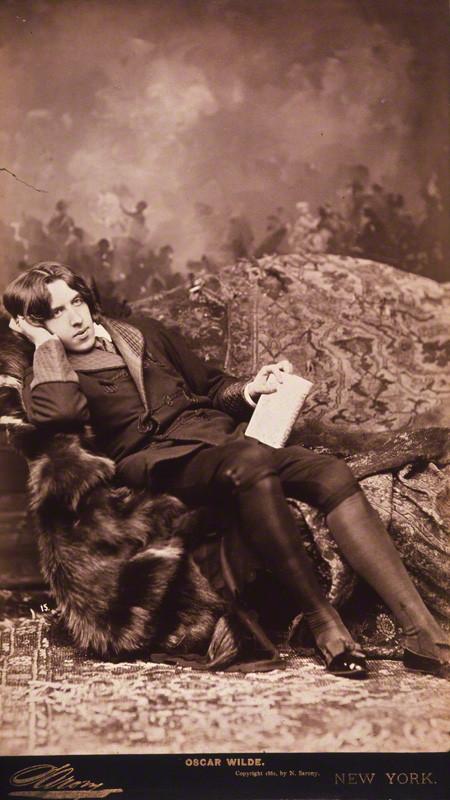
Oscar Wilde. Photo: National Portrait Gallery, London.
Like a lot of mawkish teenage girls with a bent towards the GOTHIC, I had a bit of a crush on Oscar Wilde in the nineties. It started when I was doing my GCSEs when an unusually sympathetic teacher joined my school and introduced me to the world of The Importance of Being Earnest. The rest of the class begrudgingly bought cheap editions of the play but, already hooked, I remember forking out in Waterstones for a big collection of all his plays and works, which I still treasure many years on.
Next of course, there came the Richard Ellmann biography, which I read dozens of times as a teenager and then as a melancholy undergraduate, soaking up the richness of Wilde’s prose, the evident love of the biographer for his subject and the horrible turmoil then tragedy of Wilde’s personal life.
Another favorite book at this time was The Last Will and Testament of Oscar Wilde by Peter Ackroyd, which I first read, mostly uncomprehendingly, at fourteen but again reread several times over the years, adoring the language and imagery.
My love of Oscar Wilde was such that I even made him the subject of my GCSE Art exam when I spent it painstakingly designing a memorial statue for him based on the portrait above, which I painted in watercolour from all angles and wept profusely over. I totally failed GCSE Art, but I didn’t hold Oscar responsible for this, preferring instead to blame the ugly aesthetic principles of the ignorant, dullard examiners, which is what I felt Oscar himself would have done had he been in my shoes.
Also, in what I felt was true Wildean style, I refused to paint or draw anything ever again after this low point in my creative career, preferring instead to pursue Art History as a form of rebellion against those who were clearly trying to oppress my artistic genius. Yes, you know what they say – those who can do and those who can’t go to university to learn how to bitch about the ones who can.
Later on, as an undergraduate I paid my one and only visit to Père Lachaise, pausing to buy a single white lily at the gates then tramping across the cemetery to Wilde’s rather ugly yet stately grave at the far end, where I reverently placed it, admiring the patina of fading rosy lipsticked kisses that covered the front of the marble tomb but demurring to add my own.
Sadly, my enthusiasm dimmed as every day life took over and I had less time to read and daydream and obsess about poets and revolutionaries, but there remained a special place in my heart for Oscar all the same, as evidenced most latterly by my naming my youngest son in his honor : Oscar Sebastian after Oscar Wilde and Sebastian Melmoth, the name he assumed during the early years of his exile after being released from prison.
Poor Oscar. I don’t think his latter day birthdays were very happy but I think it may have cheered him up a great deal to know how much he continues to be loved now. Of course it would probably have cheered him up a lot more if each of his admirers was able to time travel back to Paris and buy him some absinthe and cake, but hey ho, you can’t have everything.
Happy birthday Oscar, you lovely man, may you continue to inspire, enchant and entertain forever.
******
Check out my new alternative lifestyle blog, Gin Blossoms!
‘Frothy, light hearted, gorgeous. The perfect summer read.’ Minette, my young adult novel of 17th century posh doom and intrigue is now £2.02 from Amazon UK and $2.99 from Amazon US.
Blood Sisters, my novel of posh doom and iniquity during the French Revolution is just a fiver (offer is UK only sorry!) right now! Just use the clicky box on my blog sidebar to order your copy!
Follow me on Instagram.
